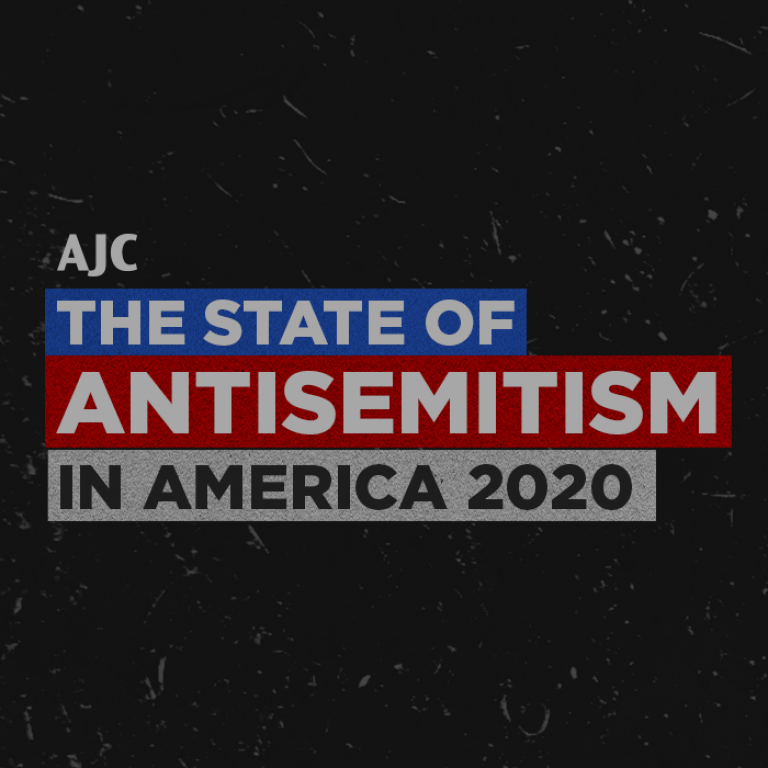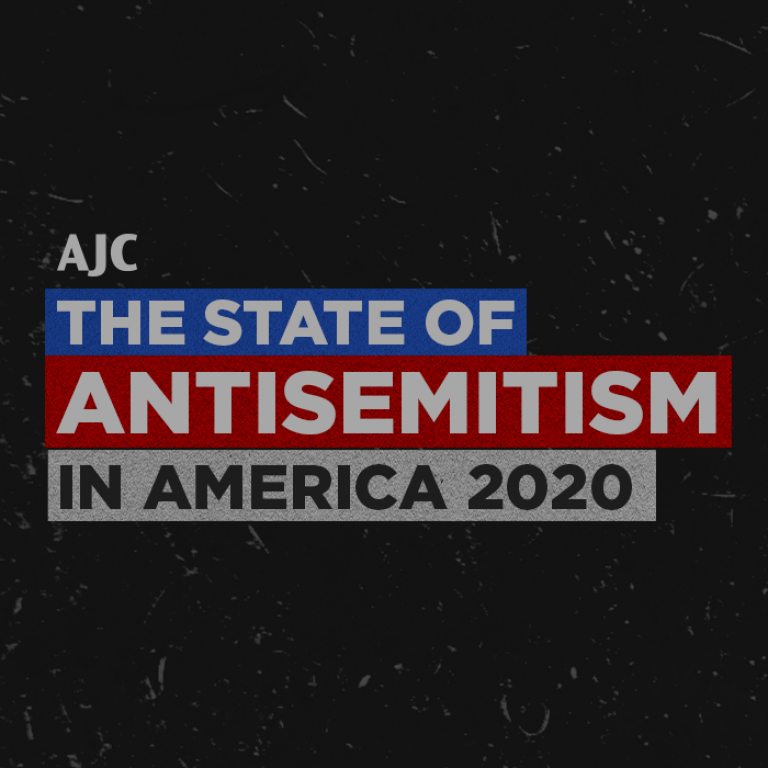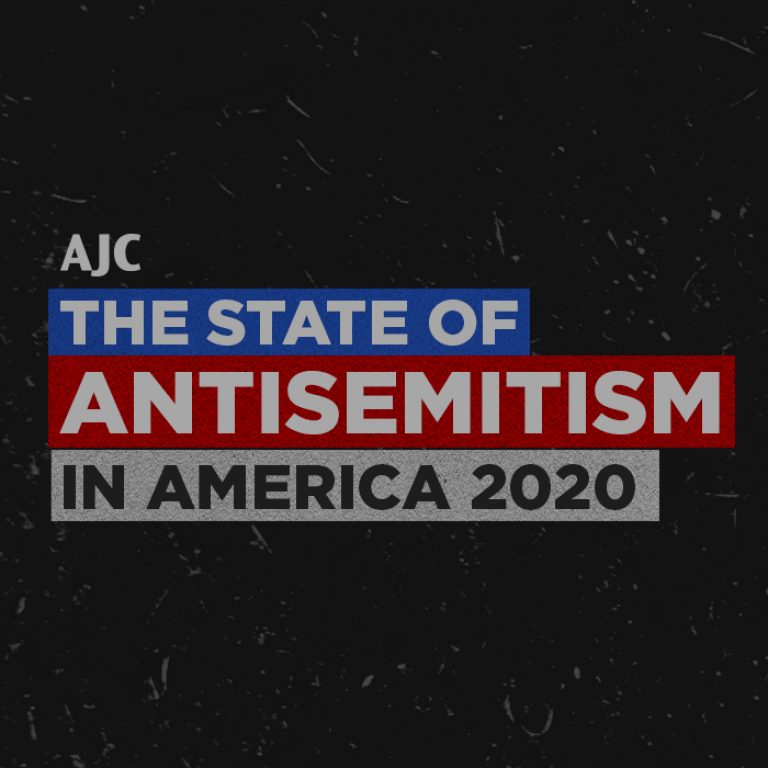October 26, 2020
One year ago, the American Jewish Committee (AJC) released a groundbreaking piece of research – the first-ever survey of American Jews on antisemitism in America. Released on the first anniversary of the deadly Pittsburgh synagogue shooting, the worst antisemitic attack in American history, the findings revealed grave cause for concern about rising antisemitism and deep concern that it is getting worse. The survey findings drew widespread media coverage, as well as the attention of policymakers, law enforcement officials, Jewish leaders, and partners in other faith and ethnic communities. As we engaged with those interlocutors and others, it became increasingly clear that the survey must become an annual endeavor, in order to enable us to track Jewish experiences and perceptions of antisemitism and calibrate our advocacy and education efforts accordingly. It also became apparent that, while Jewish perspectives are critical to understanding and fighting Jew-hatred, it is no less important to understand how the American public—our neighbors of other faiths and backgrounds—perceives antisemitism. Our efforts to fight anti-Jewish sentiment do not occur in a vacuum: they take place in public squares, on college campuses, in state capitols, on the national airwaves, and in myriad other places across America. All Americans are potential partners as we seek to combat antisemitism and other forms of hate.
This year, for the first time, we carried out two surveys in parallel, aided by the leading opinion research firm SSRS. The first, conducted among American Jews, closely mirrored last year’s survey, asking many of the same questions about perceptions and experiences of antisemitism in America in order to enable us to identify trends in Jewish perspectives on this critical issue. With 1,334 respondents, it is among the largest scientific surveys of American Jews ever conducted by a major Jewish organization. The second, conducted among the general public, asked some of the same questions asked of Jewish respondents while supplementing them with questions that seek to reveal how Americans perceive and experience antisemitism. It is the first survey of its kind on this subject. Combined, the two surveys form the first-ever AJC State of Antisemitism in America Report. This report lays bare the very different ways American Jews and the general public understand antisemitism, enabling us to identify key challenges and more effectively target our education and advocacy efforts as we seek to eradicate this most ancient form of hatred.
American Jews on Antisemitism
Persistent and Worsening
American Jews remain deeply concerned about rising antisemitism in America. Nearly nine out of ten American Jews (88%) believe antisemitism is a problem in the United States today and more than four out of five (82%) believe it has increased over the past five years, with a plurality (43%) saying it has increased a lot. These figures are almost identical to last year’s, when 88% of respondents said antisemitism was a problem, 84% said it had gotten worse over the past five years, and 43% said it had increased a lot. Concern about antisemitism is shared by American Jews regardless of age, political leaning, or religious affiliation. Perhaps unsurprisingly, those who have been personally targeted by antisemitism over the past five years or whose Jewish institutions have been targeted by antisemitism in the two years since the Pittsburgh synagogue attack were more likely to say antisemitism has increased than those who have not.
More than one in three American Jews (37%) say they have been the victims of antisemitism over the past five years, including a quarter (25%) who say they have encountered antisemitic remarks in person, by mail, or by phone; over a fifth (22%) who have been targeted by antisemitic remarks online or through social media; and 3% who have been physically assaulted for being Jewish. These figures are similar to those reported in 2019, when 35% of respondents said they have encountered antisemitism in one of those forms. Notably, younger respondents—American Jews between the ages of 18 and 29 and between 30 and 49—were more likely than older respondents to have been targets of antisemitism, four out of ten (41%) saying they’ve been victims of an antisemitic incident, compared to 31% of those over 50. Nearly a quarter (23%) of respondents say they or someone they know have experienced antisemitism on a college campus over the past five years; perhaps unsurprisingly, that number rises to 43% of those between the ages of 18 and 29.
Of the 22% of American Jews who were the targets of antisemitism on a social media platform, a clear majority of 62% encountered it on Facebook, 33% on Twitter, 12% on Instagram, 10% on YouTube, 5% on Snapchat, 2% on TikTok, and 10% elsewhere. Slightly more than half of respondents (53%) said the social media company or online service to which they reported having encountered antisemitism took action in response to their complaint, while 46% said it did not.
Concealing Jewishness and Limiting Behaviors to Avoid Attack
American Jews are avoiding certain places or activities out of concern for their safety as Jews in greater numbers than they reported in 2019. Nearly one out of every three American Jews (31%) say they either always (4%), frequently (3%), or sometimes (24%) avoid certain places, events, or situations out of concern for their safety or comfort as Jews. This represents an increase over the figures reported in the 2019 survey, when a quarter of respondents said that they take such measures at any frequency. A majority (55%) of Orthodox Jews—who are often more identifiably Jewish and who have been targeted by recent attacks in New York and elsewhere—say they avoid places or situations at least some of the time, compared to minorities of those who identify as Conservative, Reform, or secular (43%, 33%, and 24%, respectively). Again, perhaps unsurprisingly, those who have themselves been targeted by antisemitism or whose Jewish institutions have been are more likely to avoid certain situations than those who have not (38% vs. 27% and 50% vs. 26%).
In the two years since the Pittsburgh synagogue attack, more than a third of American Jews (37%) have taken steps to conceal their Jewishness in public. Nearly a quarter (24%) say they have avoided wearing, carrying, or displaying items that would enable others to identify them as Jewish. A similar number—again, 24%—have refrained from posting content online that would identify them as Jews or reveal their views on Jewish issues. One out of ten (10%) have avoided visiting Jewish institutions or participating in Jewish events out of concern for their safety in such settings. Unsurprisingly, those who either have personally experienced antisemitism or whose Jewish institutions have been targeted thereby are more likely to have taken measures to limit their exposure as Jews. 34% of individuals who have been personally targeted by antisemitism have avoided wearing or displaying items that might identify them as Jewish, compared to 18% of those who have not. Those whose Jewish institutions have been targeted were more than twice as likely to avoid visiting Jewish institutions or participating in Jewish events due to safety concerns (17% vs. 7%).
More than a quarter of American Jewish respondents (27%) said that Jewish institutions with which they are affiliated have been the targets of antisemitism in the two years since the Pittsburgh synagogue attack, with the largest share (17%) saying they’ve been targeted with graffiti, 16% saying they’ve received threats, and 8% saying they’ve been physically attacked. Orthodox respondents were the most likely to say their institutions have been targeted (45%), compared to 40% of Reconstructionist, 36% of Conservative, 33% of Reform, and 16% of secular respondents. 56% of American Jews say their Jewish institutions have increased security in response to the Pittsburgh synagogue attack, compared to 32% who say security measures are about the same as they were before the attack.
Antisemitism on Both Extremes of the Political Spectrum
American Jews see antisemitism on the far right, on the hard left, and among those who engage in extremism in the name of Islam, but they do not believe that all three pose an equal threat. While 89% view the extreme right as posing an antisemitic threat to American Jews, with 49% saying it poses a very serious threat and 26% saying it poses a moderately serious threat, only 61% say the same about the extreme left, with 16% each saying it poses a very or moderately serious antisemitic threat. Similarly, while 69% of American Jews said the Republican Party holds many (27%) or some (42%) antisemitic views, only 37% said the same of the Democratic Party (11% said a lot and 26% said some). Unlike respondents of other denominational affiliations, Orthodox Jews are more likely to see antisemitism on the left, rather than the right, with 66% of Orthodox respondents saying the Democratic Party holds many or some antisemitic views and only 22% saying the same of the Republican Party. Large majorities of American Jews of all denominations—85% overall—view extremism in the name of Islam as posing an antisemitic threat, with 27% saying it poses a very serious threat and 26% saying it poses a moderately serious threat to American Jews.
Strong Links between Hostility toward Israel and Antisemitism
There is widespread recognition among American Jews that hostility toward Israel and hatred of Jews are closely intertwined.
Anti-Zionism—that is, the belief that Israel has no right to exist—is viewed by the overwhelming majority of American Jews as antisemitic. 85% of respondents said the statement “Israel has no right to exist” is antisemitic, compared to only 14% who disagreed. The belief that anti-Zionism is antisemitic is shared by large majorities of American Jews of all ages, religious denominations, and political affiliations, with 75% of young people between the ages of 18 and 29, 83% of those between 30 and 49, 93% of those between 50 and 64, and 90% of those 65 or older sharing that belief. 84% of American Jews believe the statement “The U.S. government only supports Israel because of Jewish money” is antisemitic and 76% believe the same about the statement “American Jews are more loyal to Israel than to America.”
Of respondents who were at least somewhat familiar with the Boycott, Divestment, and Sanctions Movement against Israel, fully 80% said it is either mostly antisemitic or has antisemitic supporters, while only 15% said it is not mostly antisemitic. The more American Jews know about the BDS Movement, the more likely they are to view it as antisemitic: among those who reported being most familiar with the movement, a majority—52%—said it is mostly antisemitic, compared to only 29% of those who said they are less familiar with it.
The General Public on Antisemitism
Unfamiliarity with the Term
Nearly half of Americans are unfamiliar with the term “antisemitism.” While just over half (53%) of the general public has heard of antisemitism and knows what it means, a quarter of respondents (25%) said they had heard the term but aren’t sure what it means and fully a fifth—21%—said they had never heard the term before. Young people between the ages of 19 and 29 are least familiar with the term, with fewer than half (47%) saying they’ve heard of antisemitism and know what it means—less than any other age group. There is a strong link between education levels and familiarity with the term “antisemitism”: 79% of college graduates know what antisemitism is, compared to just over a quarter (27%) of those who didn’t complete high school or who only hold a high school diploma. Differences across party affiliations are insignificant, with 55% of Democrats saying they’ve heard of antisemitism and know what it means, compared to 54% of independents and 50% of Republicans.
A Problem, But Not Getting Worse
The general public agrees with American Jews that antisemitism is a problem in America—but in far smaller numbers. 63% of the general public believes antisemitism is either a very serious problem (19%) or is somewhat of a problem in America (43%), compared to 88% of American Jews. A third of the general public said antisemitism either isn’t much of a problem (23%) or isn’t a problem at all (10%), compared to a mere 11% of American Jews who said either. The discrepancy between general and Jewish perceptions of antisemitism in America is even starker when it comes to the question of whether or not antisemitism has gotten worse over the past five years. Whereas 82% of American Jews said antisemitism had increased over the past half-decade, only 43% of the general public said so, with 39% saying it has remained the same and 14% saying it has actually decreased. Again, education levels played a significant role in general perceptions of antisemitism: whereas 72% of college graduates said antisemitism is a problem in America and 51% said it has gotten worse over the past five years, those numbers plummeted to 53% and 36% among those with a high school education or less. There were differences, too, across party affiliations: 71% of Democrats believe antisemitism to be a problem in America, compared to 58% of independents and 57% of Republicans. 52% of Democrats say antisemitism has gotten worse over the past five years; 39% of independents and 34% of Republicans say so. The more Americans know about antisemitism, the more likely they are to believe it has increased in recent years, with a majority (52%) of those who reported the most familiarity with antisemitism saying it is on the rise, compared to only 31% of those who said they were less familiar with it.
Nearly half of the U.S. general public (48%) reports having witnessed antisemitism in some form over the past five years, with 36% saying they have witnessed more than one antisemitic incident—online or in person—during that period.
Jews Not the Arbiters of Antisemitism
A large majority of Americans would not defer to Jews in evaluating whether or not something is antisemitic. Nearly two thirds of respondents (65%) said it would make no difference to them if a Jewish individual or organization considered a statement or idea to be antisemitic; only 25% said it would make them more likely to consider it antisemitic and 7% said that knowing that a Jewish person or group considered something antisemitic would actually make them less likely to view it as such. Young people are more likely than older Americans to defer to Jews in determining what is or is not antisemitic, with 28% respondents between the ages of 18 and 29 saying that the views of a Jewish individual or organization would make them more likely to consider an idea or statement antisemitic, compared to only 17% of those aged 65 or older. Democrats are also more likely to defer to Jewish views on antisemitism, with 31% of those who affiliate with the Democratic Party saying that knowing that Jews considered something antisemitic would make them more likely to do so as well, compared to 20% of Republicans and 22% of independents. 35% of those with a college degree said they would be more inclined to consider something antisemitic if they knew a Jewish person or group did, as opposed to 24% of those who had completed only some college-level education and 16% of those who only had a high school education.
Antisemitism from Political Parties
Like American Jews, the general public sees antisemitism in both major American political parties, but to a lesser extent and—again, like American Jews—more in one party than in the other. Just over half of Americans (52%) believe the Republican Party holds at least some antisemitic views, while 42% say the same about the Democratic Party. 69% American Jews, on the other hand, believe the Republican Party holds at least some antisemitic views, compared to 37% who believe the same of the Democratic Party. Unsurprisingly, individuals affiliated with a political party were more likely to view the other party as holding antisemitic views, while 43% of independents said the Republican Party holds at least some antisemitic views and 37% said the same of the Democratic Party.
Anti-Zionism is Viewed as Antisemitic, But Conspiracy Theories Less So
Like American Jews, Americans overwhelmingly view anti-Zionism as a form of antisemitism. Approximately three quarters (74%) of the U.S. general public believes that the statement “Israel has no right to exist” is antisemitic, compared to 85% of American Jews. This belief is shared by Americans of all age groups, political affiliations, and education levels. Nearly three quarters of young people between the ages of 18 and 29 (73%) view anti-Zionism as antisemitic, as do 77% of those aged 30-49 and 50-64 and 68% of those 65 or older. 81% of Americans with at least a college degree view the denial of Israel’s right to exist as antisemitic, as do 79% of those with some college education and 66% of those with a high school degree or less. Nearly two thirds of both Republicans (74%) and Democrats (73%) believe anti-Zionism is a form of antisemitism, as do 76% of independents.
The views of American Jews and the U.S. general public diverge somewhat on two other statements posed to respondents. While 84% of Jewish Americans believe the statement “The U.S. government only supports Israel because of Jewish money” to be antisemitic, only 55% of Americans agree. And while 76% of American Jews believe the statement “American Jews are more loyal to Israel than to America” as antisemitic, only half (50%) of the general public agrees, with 43% saying it is not antisemitic and 7% saying they either don’t know or refuse to answer. Young people and those with higher education levels are more likely than others to believe either statement to be antisemitic, with two thirds (66%) of those between the ages of 18 and 29 a similar proportion (65%) of those with at least a college degree agreeing that the idea that the U.S. government only supports Israel because of Jewish financial clout is antisemitic, and 57% and 59%, respectively, saying the same about the notion that American Jews are more loyal to Israel than they are to the United States. Democrats are more likely than Republicans to view the statements as antisemitic, with 62% of Democrats viewing the first statement as antisemitic, compared to 42% of Republicans, and 58% viewing the second statement as such, compared to 41% of Republicans.
Of respondents who said they were at least somewhat familiar with the Boycott, Divestment, and Sanctions Movement against Israel, more than two thirds—69%—said it is either mostly antisemitic (21%) or has antisemitic supporters (48%), compared to only 19% who said it is not mostly antisemitic. Young Americans between the ages of 18 and 29 are most likely to view the BDS Movement as largely antisemitic, with one in four (25%) saying it is, compared to 18% of those between the ages of 30 and 49, 24% of those aged 50 to 64, and 19% of those aged 65 or older. The more educated Americans are, the more likely they are to view the BDS Movement as antisemitic: nearly one in three respondents with at least college degree (29%) said it is mostly antisemitic, while 24% of those with only some college-level education and only 10% of those with only a high school education agreed.
The Need for Holocaust Education
Majorities of both American Jews and the U.S. general public consider themselves knowledgeable about the Holocaust and believe it should be taught in American schools. 99% of American Jews and 75% of the general public say they have at least some knowledge of the Holocaust, though a far higher percentage of American Jews say they know a great deal (84%) compared to the general public (37%). College graduates believe themselves to be far more knowledgeable about the Holocaust than those with only a high school education, with 91% of respondents with at least a college degree reporting that they know a lot or some about the Holocaust, compared to 62% of those with a high school diploma or less. 99% of American Jews believe it is either very or somewhat important for American schools to teach middle and high school students about the Holocaust and 90% of the general public agree.
Closing the Gap
The findings presented in this report should trouble all Americans. Jews continue to feel vulnerable and under attack in America. That so many have been victims of antisemitism and have taken steps to conceal their Jewishness and limit their participation in Jewish life out of fear for their personal safety serves as a potent reminder that Jew-hatred remains a constant presence in the lives of Jewish Americans. At the same time, that nearly half of Americans—and three quarters of those without a college education—do not even know what antisemitism is or means is a damning indictment of the American education system. The disparity between the overwhelming majority of American Jews who view antisemitism as being on the rise and the minority of the general public who perceive the same should draw hard questions about the lack of awareness among Americans of the distress felt by their Jewish neighbors. And the widespread belief that the views of American Jews need not be taken into account when evaluating whether or not something is antisemitic begs the question of whether Americans would apply the same standard to other groups targeted by hate or bigotry.
If there is cause for optimism in these worrying findings, it is that education begets greater understanding of antisemitism and of the lived experiences of American Jews. In nearly each of the questions presented in our survey of the general public, those who had completed more years in educational frameworks displayed greater attunement and sensitivity to the experiences and sentiments of Jewish Americans. Put simply, the more Americans know about antisemitism, the more they come to view it as American Jews do. Our efforts against the scourge of antisemitism must thus include a significantly enhanced educational component aimed at explaining the meaning, nature, and impact of contemporary antisemitism to Americans of all ages, backgrounds, and walks of life. That the need for Holocaust education in middle and high schools is so widely acknowledged is welcome news, but it is evident that American schools must do more to educate students about present-day Jew-hatred and that the educational process must extend well beyond and after the classroom. The Jewish community must work with its partners in federal, state, and local governments; in the private sector; and in other faith and ethnic communities to expand education throughout American society about the various forms and manifestations of modern antisemitism. The more knowledgeable Americans become about antisemitism, the more committed and effective allies they will be in combating it.
Avi Mayer is AJC’s Managing Director of Global Communications






